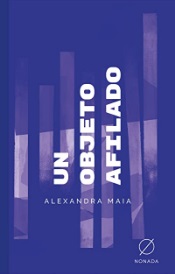Bogotá: Ediciones Vestigio. 2020. 119 pages.
 In Un objeto afilado, a collection of poems by Brazilian writer Alexandra Maia, there is a spark of dissatisfaction that creates a tension between what one is and what one yearns for. To read these poems is to observe the movement of the tectonic plates of desire. These poems of desire don’t exert control over what they describe and evoke; they’re not an organized representation of wanting something more. A poem is not the submission of language to an expressive desire. It’s an exploration of word and silence as ventilation shafts of something pulsating that resides within. Angolan writer Ondjaki summarizes it well in the poem-epilogue that closes the book: this book opens and defends a poetic space for “non-domesticated materials.”
In Un objeto afilado, a collection of poems by Brazilian writer Alexandra Maia, there is a spark of dissatisfaction that creates a tension between what one is and what one yearns for. To read these poems is to observe the movement of the tectonic plates of desire. These poems of desire don’t exert control over what they describe and evoke; they’re not an organized representation of wanting something more. A poem is not the submission of language to an expressive desire. It’s an exploration of word and silence as ventilation shafts of something pulsating that resides within. Angolan writer Ondjaki summarizes it well in the poem-epilogue that closes the book: this book opens and defends a poetic space for “non-domesticated materials.”
These poems are like bonfires with free will, yearning for combustion behind each spark. Nevertheless, they are ambiguous resistors to darkness. There is a tension with this darkness, but they continue needing it in order to create an image, a feeling. The relationship between words and silences is not exclusionary. Silence is the moment prior to the beginning of the poem, it is its prelude; it contains the seedling of what will begin to happen. Although meaning is not clear and remains hidden, writing still pursues it; in “De las mil palabras” [“Of the thousand words”] we read: “De las mil palabras / que me piden que diga / vive en el silencio la más pura de ellas” [“Of the thousand words / that I am asked to say / the purest one lives in silence”].
In this journey to find the meaning of words, the poem becomes a vision that allows one to get a closer look into the world. It’s not about clearly translating or representing experiences or feelings; it recognizes the difference between living and naming. Although the poem is not a stable receptacle for life, the voice trusts it, indicating in “Biopsia”: “en la cavidad del verso esculpo esta ausencia por no saber vivirla” [“in the hollowness of the verse, I sculpt this absence for not knowing how to experience it”]. She even goes on to say, later, in an untitled poem: “Deseo un poema / como quien nace” [“I desire a poem / as one who is born”]; the poem becomes a way of being, a method of existence in the world. Nevertheless, it’s an ambiguous exercise. We don’t know if the poem allows for exploring dark and uncharted areas in search of something new, or only for looking at inner territories to rediscover things that had been hidden within itself. To read Maia is to remember that poetry always implies a certain unraveling. In these verses, the voice returns to her and her past as if they were distant and rediscovers them, giving them a new life.
Although in this book it seems like the verse reaches a transcendental potential, some poems turn towards the reader and, in a few lines, generate the effect of an audiovisual production that breaks the fourth wall that separates the viewed from the viewer. It constructs a world full of life only to show us who or what winds the toy’s mechanism, making it imitate life without living it. There is a tension between construction and destruction: the messages self-destruct, they fail to reach us in the reading, and already they begin to disappear. These poems give life to things just to leave them to die, or even kill them.





